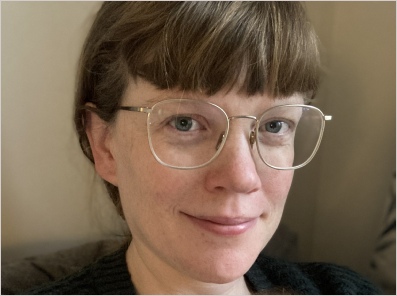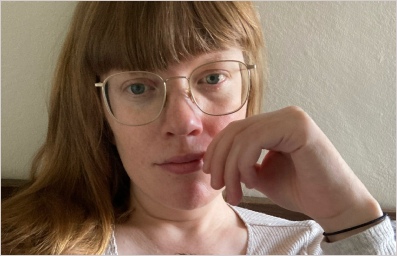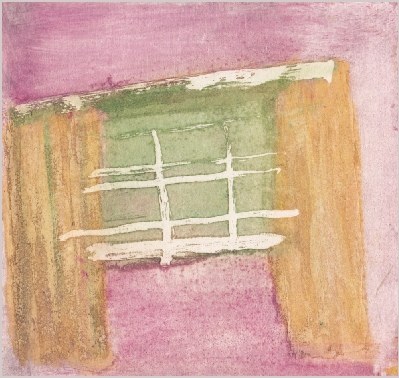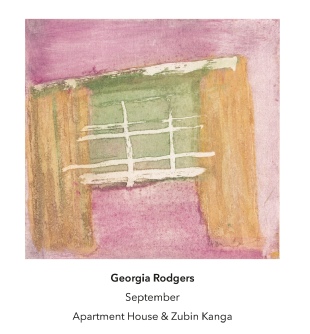Another Timbre TimHarrisonbre
at181 Georgia Rodgers ‘September’ - Apartment House & Zubin Kanga
1. Base (2019) 5:47 James Opstad (double bass) Joe Qiu (bassoon) youtube extract
2. Three Pieces for String Quartet (2016) 12:09
Mira Benjamin & Gordon Mackay (violins) Bridget Carey (viola) Anton Lukoszevieze (cello)
3. St Andrew’s Lyddington (2017) 8:59 Mira Benjamin (violin) Mark Knoop (piano)
4. Ringinglow (2021) 11:52 Zubin Kanga (piano & sine tones) youtube extract
5. York Minster (2018) 5:31 Kathryn Williams (flute) Mark Knoop (piano) Anton Lukoszevieze (cello)
6. Logistic (2010) 4:17 Georgia Rodgers (electronics)
7. Masking Set (2016) 10:25 Sara Rodrigues (voice) Bridget Carey (viola) Anton Lukoszevieze (cello)
8. September (2019) 13:23 Mark Knoop (piano) Mira Benjamin (violin) Bridget Carey (viola)
Anton Lukoszevieze (cello) Simon Limbrick (percussion)
Cover painting by Daisy Jarrett
CD copies have sold out, but downloads are available from Bandcamp here
Interview with Georgia Rodgers
Can you tell us a bit about your background, and how you came to contemporary music?
I played a lot of music at school, mostly drum kit and percussion in jazz bands and the school orchestra. I didn’t start composing till a while later. At Edinburgh University I studied Physics and Music, the music part focussing on the behaviour of sound waves and sound recording. It was during a masters in digital music with Michael Edwards that I first encountered experimental music and started composing my own stuff. I remember being introduced to Xenakis’ ‘Formalized music’ - a book which really opened things up for me. After that I did a PhD in composition at City University with Newton Armstrong, whilst also working part-time as an acoustic engineer, specialising in architectural acoustics.
That’s interesting, it’s an unusual pathway into composition. Does the fact that you didn’t go through the more conventional route of a practice-based music degree leave you feeling slightly apart from the mainstream of contemporary music - if such a thing exists? Or do you feel it has advantages to come from a science background?
I’ve definitely felt like an outsider at times, and had to work to plug a fair few gaps in my knowledge when writing for acoustic instruments. But the longer I’ve been doing it the more confident I’ve become (although confidence is easier said than done sometimes). I try and remember that music is for everyone, and there shouldn’t be any rules about who’s ‘allowed’ to create it. I also know that my particular background allows me to approach projects in different ways, and to ask questions which can lead to interesting results.
Your output as a composer seems to divide into two categories, electronic and instrumental. 'Logistic' is the only example of the former on this CD, but to my ears whereas your electronic pieces are more concerned with texture or timbre, the instrumental pieces are primarily concerned with pitch and harmony. Is this a fair or a misleading characterisation of your work?
I think the thing I’m always concerned with in my work is the experience of listening, as a physical and psychological phenomenon - what is it like to listen? And so when I’m making a piece for acoustic instruments or electronics (or both together), I’m always trying to break things down into their component parts to find out how they work. This seems to lead me to use reduced palettes of material, such as simple harmonies, subtle differences in texture or tone.
Yes, that quality of reducing material to basics is very evident listening to a piece like ‘Base’. It’s elementary yet so beautiful, like Laurence Crane’s music, so I guessed – evidently wrongly - that you’d probably studied with him. How did ‘Base’ come about, and why the unusual instrumentation?
The instrumentation for ‘Base’ came about because Alex Nikiporenko asked me to compose a piece specifically for the next 840 concert, which happened to be given by a double bass and bassoon duo. The combination of timbres was really intriguing and I wanted to let these sounds be the focus of the music.
I’ve not studied formally with Laurence Crane but I love his music and have looked at a lot of his scores. I’d also been reading and listening to Tom Johnson’s work. So ‘Base’ was created through the application of some simple counting procedures - adding or taking away a note from a phrase after a certain number of measures, repeating, and following through to the end.
Several of your pieces (York Minster, St Andrew's Lyddington, Ringinglow) have titles referring to particular buildings or places. Is there a particular significance to this (eg are the pieces in any way portraits of the locations?), or is it just a simple way of giving each piece a title?
The first two pieces you mention are closely related to the buildings they are named after - the pitches used in the pieces are derived from the resonant frequencies of the spaces, so a few cents sharp or flat from equal temperament. Ringinglow is more simply a place name which I think is also a lovely word, and seemed to fit the piece nicely. It’s about the difference between mathematical harmonics and real life harmonics of piano strings, which differ a little bit. In Ringinglow the sine tones play the mathematical harmonics, leading to a slight detuning effect between the electronics and the piano. I’ve got a few more place names in mind for future pieces.
Masking Set started as an investigation into what happens when the three instruments play very similar pitches, leading to a masking effect in our ears. I think quite a lot of my ideas start off from thinking about physical acoustic or psychoacoustic effects, using these as a starting point and finding where it leads me.
Tell us about September, the title piece for the CD. How did this come piece about, and what’s the significance of its title?
‘September’ was commissioned by Rainy Days festival in 2019, to be premiered at a concert given by Apartment House. Following on from ‘Base’, the piece was also constructed by using various simple counting procedures, but when these are nested amongst five instruments a little more complexity emerges. I love hearing the procedures unwind, I find it allows me to focus on the sound of the instruments in a different way when it’s sort of predictable what’s coming next.
The title ‘September’ is the month in which the piece was completed, and it felt appropriate because I’ve always liked the way September to December have ended up wrongly numbered in our modern calendar (being the ninth to twelfth months, not the seventh to tenth). September also has extra significance now because it’s the month my wonderful daughter Nora was born in in 2021.



Cover artwork by Daisy Jarrett
Georgia Rodgers
Georgia Rodgers
